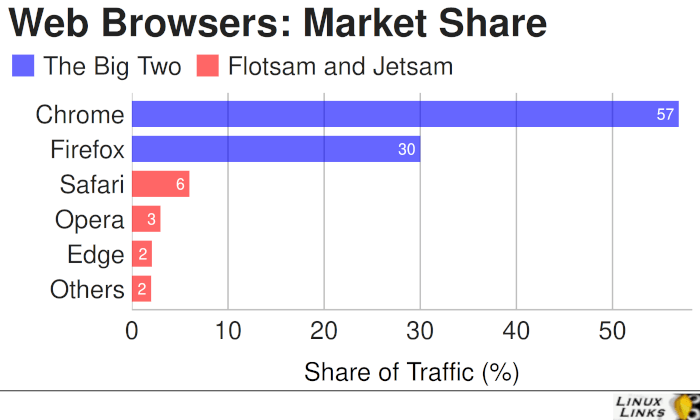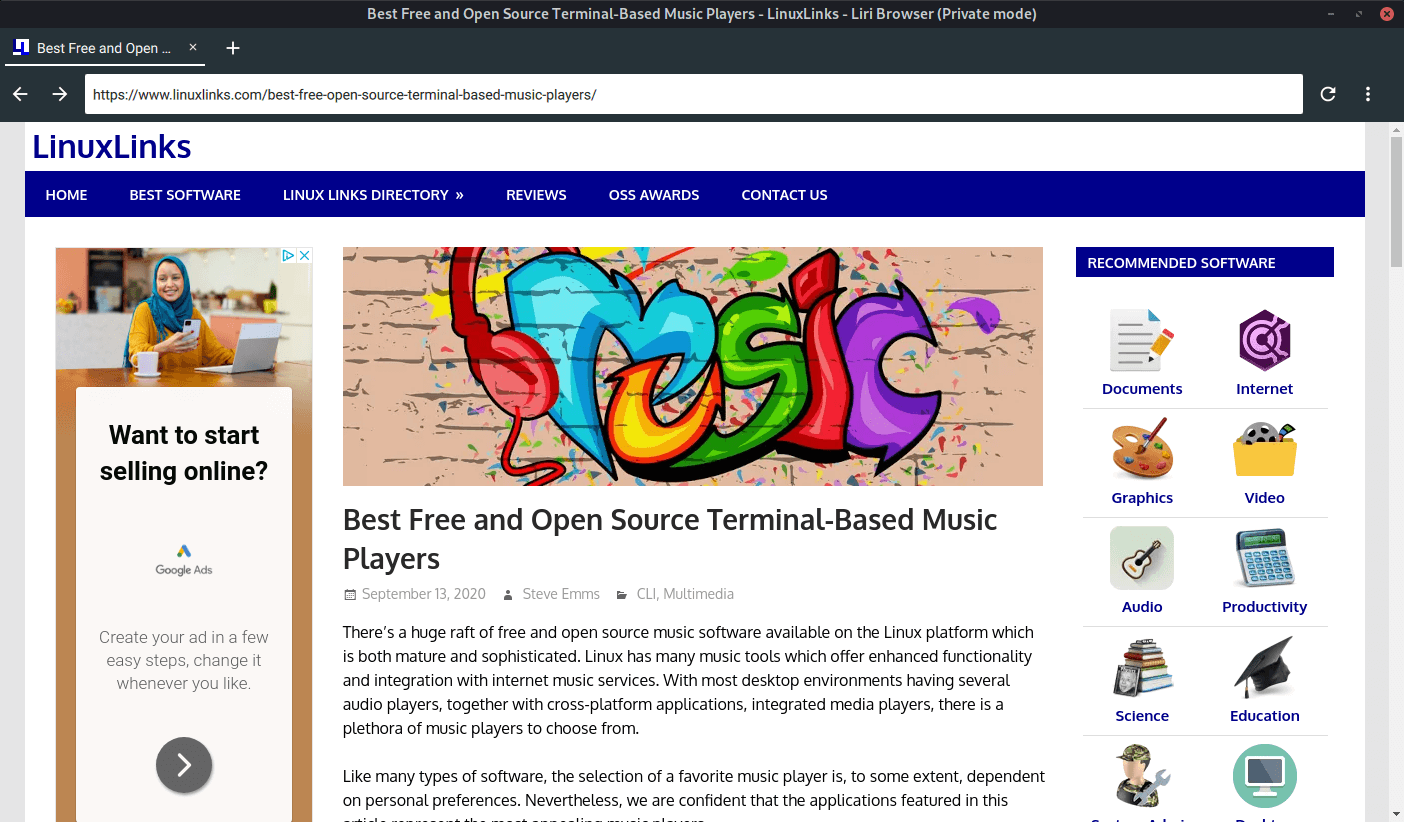Last Updated on September 27, 2020
The Linux web browser market is dominated by two heavyweights: Google Chrome and Mozilla Firefox.

This is illustrated by the image to the left which depicts the web browser share for visits to LinuxLinks.com for the period covering June – September 2020.
But Chrome and Firefox are not for everyone. Chrome is proprietary software so it’s not very appealing to open source enthusiasts. There’s the open source Chromium, of course, but that’s not very popular. And Firefox has been steadily losing market share.
Over the years, there’s been a myriad of other web browsers that appeared very promising. In late 2014 and 2015, we published a couple of articles promoting 7 up-and-coming web browsers. All were in a very early stage of development. Definitely not stable, feature complete or remotely ready for a production environment. But they all were very promising for different reasons.
The seven web browsers in question are eww, Liri, Vivaldi, Ubuntu Internet Browser, Fifth, Dooscape, and Breach. How did these 7 web browser fare over the last 5 years? Did they see a stable release, were they able to capture any market share at all, or are they only remembered like fingerprints on an abandoned handrail?
eww

Emacs Web Wowser (commonly known as eww) is a web browser written in Emacs Lisp. It was incorporated into Emacs in November 2014. If you’ve lived in a cave for the past 44 years, or you’re new to the open source scene, you might be unaware that Emacs is a family of text editors. Highly respected but divides opinion; like the marmite of text editors.
eww is still under development, and remains part of Emacs. Fire up Emacs, invoke M-x, type eww and you’re ready to rumble. Surf the net from a terminal.
If you’re happy with a terminal-based web browser, eww is a good choice. It handles cookies, uses the HTML renderer shr, maintains the history at run-time, PDFs are rendered inline, and lets you bookmark URLs. Browsing is fast, it’ll run on low spec machines, and doesn’t use big globs of memory.
While we love terminal-based software, when it comes to web browsers, it’s hard to recommend eww for most use cases.
Liri

We’d long forgotten about this web browser as it’s hardly had any coverage over the last 5 years.
You therefore may be unaware, Liri is a Material Design graphical web browser.
Liri hasn’t been abandoned. It doesn’t get frequent updates though with the latest build dated May 2019. There’s a package in the Arch User Repository. And it builds successfully. The Arch package gives us that latest build, and according to the command liri-browser -v it’s version 1.2.0.
Even though 5 years has elapsed since we last looked at Liri, the project’s website still confirms that Liri Browser remains in an alpha stage of development.
Liri retains its exceptionally minimal user interface. And it doesn’t track you. With a single tab open, the browser uses around 460MB of RAM. Would we recommend Liri? The succinct answer is no.
Vivaldi

The bad news first. Vivaldi is proprietary freeware. If you only use open source software, Vivaldi is a non-starter.
Vivaldi comes from the same team that developed Opera back in the day.
The good news. Vivaldi has matured enormously over the past 5 years. OK, it hasn’t made any significant in-roads in terms of market share, but it has lived up to its promise with a good set of nifty features, a good privacy policy, it’s fast and customizable, and runs well even on ridiculously low-power machines like the Raspberry Pi single-board computers.
Ubuntu Internet Browser
Ubuntu Internet Browser is a lightweight user interface on top of the Oxide browser engine. This web browser was designed for Ubuntu Touch, a mobile version of the Ubuntu operating system, and was never intended for the traditional desktop.
Ubuntu Touch was started by Canonical but they terminated support in April 2017. Ubuntu Touch development was transferred to UBports as a community project with the latest release in May 2020.
Fifth
Fifth sadly never saw a stable release.
It was based on the WebKitFLTK web library, and sought to retain the best features of Opera, and at the same time adding a few new features along the way. Fifth managed to survive for a few years seeing its last release in April 2016.
There’s still a package for Fifth in the Arch User Repository (for Arch and Arch-based distributions) but it fails to build. That’s not really important, as while the project’s website is still up, the program is as dead as a dodo. A shame, as Fifth ticked quite a few boxes, particularity as it tried to avoid the bloat commonly associated with web browsers. Who really thinks a web browser consuming multiple GBs of RAM is desirable?
Dooscape
Dooscape’s development started in late 2013. It was built with the Qt framework and used WebKit, a browser engine developed by Apple. It was notable for its attractive interface, modern appearance, and innovative features.
The web browser’s existence was short-lived even by web browser standards. By the final quarter of 2014 the project was firmly abandoned. The source code is still kicking around on GitLab if you’re barmy enough to want to investigate further.
Breach
Breach was definitely exciting compared to the web browser heavyweights of its day. It tried to be different in many respects.
It was billed as written entirely in JavaScript, although it used Chromium Content Module layer which was millions of C++ code. Only the UI was coded entirely in JavaScript and HTML5.
Breach saw an alpha release in July 2014 which was very barebones. Even basics like bookmarks weren’t present. And then it sank like a stone.
Summary
It takes a long time for a web browser to build up a reasonable market share. And creating, maintaining and improving a web browser is an enormous amount of work. Far too much work for a tiny development team or single developer. Most web browsers fall by the wayside. And when they are dead they remain dead — there’s rarely a phoenix from the flames.
Only Vivaldi has succeeded in obtaining any tangible market share of the web browser market, but that share is tiny. Breaking Chrome’s monopoly of the web browser market will be as hard as usurping their dominance of the search engine.
All the articles in this series:
| Now and Then - See How Promising Open Source Software Has Fared | |
|---|---|
| DFileManager | A venerable file manager |
| More Distributions | The fate of 15 more distributions |
| Programming Languages | Go, Rust, Dart, Julia, Clojure, Elixir and more |
| File Managers | SpaceFM, gentoo, Marlin, Eagle Mode, and Beesoft Commander |
| Distributions | The fate of 15 distributions |
| Lean Desktop Environments | Xfce, ROX Desktop, LXDE, FVWM-Crystal, EDE, and Étoilé |
| IDEs | Brackets, Light Table, Julia Studio, Dart Editor, and Aptana Studio |
| Music Players | qomp, Lollypop, Yarock, Pragha, and Volumio |
| Web Browsers | eww, Liri, Vivaldi, Ubuntu Internet Browser, Fifth, Dooscape, and Breach |
| Terminal Emulators | Terminology, Cool-Retro-Term, and Final Term |

Konqueror ? Used it quite a bit 10-15 years ago.
Konqueror was never promising lol